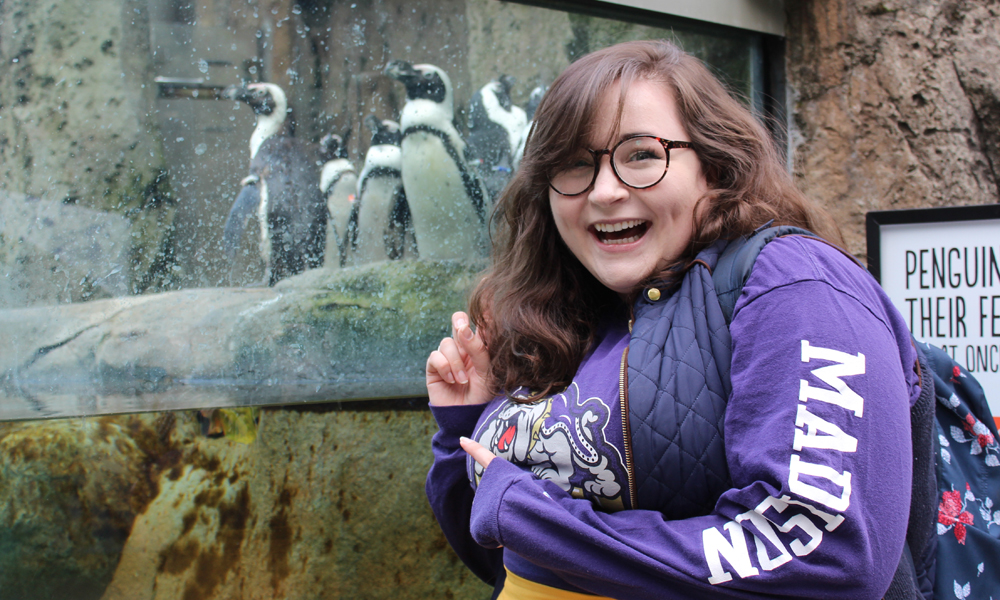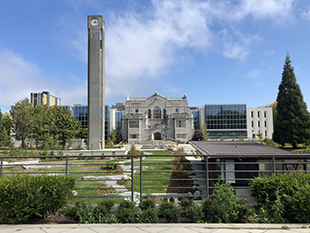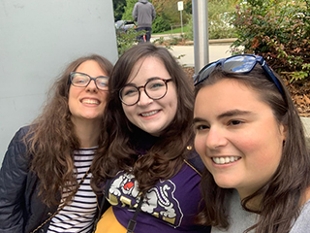Hannah Facknitz (’18) Fulbright in Canada
College of Arts & Letters Fulbrighter
News
SUMMARY: Settler historian Hannah Facknitz is currently studying for her master's at the University of British Columbia in Vancouver, British Columbia through Fulbright Canada. She graduated from JMU with a bachelor’s degree in History and minors in Arabic and humanitarian affairs.
By Hannah Facknitz ('18)
dis·lo·ca·tion• /ˌdislōˈkāSH(ə)n/ • noun
noun: dislocation; plural noun: dislocations
- disturbance from a proper, original, or usual place or state.
At the end of September, I scrawled in my journal the following:
“Is there something vital to dislocation? Does a reflected, examined life require us to disjoin, decouple ourselves from our known? Now that I am here, so far away from my known(s), there is a difference in me …There is a serenity in losing, leaving so much.”
These first weeks of Fulbright have involved significant dislocations—geographic, emotional, and intellectual. I left my hometown where I lived, learned, and worked for 28 years in order to move three thousand miles to Vancouver, British Columbia. Now, when I look eastward, I can see the North American continent stretching between myself and my community that nurtured me into existence.
There is a serenity in losing, leaving so much.
The intellectual dislocations I did not experience in parting, but in arriving in my new home. I’ve come to the University of British Columbia, located on the western extreme of the Point Grey, to study indigenous histories where Fulbright is funding the first year of a master’s program. I arrived having excelled in the College of Arts & Letters, knowing I was well-prepared to engage with challenging, new material. I trusted my education thus far to provide the tools I needed to succeed here. I believed myself ready to dive headlong into the work of doing history.
I was wrong.

Sure, I was well prepared in the sense of possessing the skills needed for graduate study. I was able to read long texts quickly and accurately, a skilled writer, and a passionate researcher, but the greatest dislocation was in the existential turmoil of engaging with the brand new, unfolding reality of indigenous studies. At UBC, major and minor gatherings begin with the following words: I would like to acknowledge that we are gathered today on the traditional, ancestral, and unceded territory of the xʷməθkʷəy̓əm (Musqueam) people.
You find variations of this statement in email signatures (mine included), official documents, student organization leaflets, and even on restaurant menus. The indigenous context is everywhere at UBC. Indigenous people have lived on this land for more than 12,000 years. This does not mean that the university or the city exists in reconciliation with the Musqueam Nation (or Tsleil-Waututh and Squamish in Vancouver), but the fact of indigenous survival, resilience, and persistence is stated constantly, positioning us in the context of ongoing colonization. We are enmeshed in ongoing colonization. I have always been a part of this settler project, be it in Virginia or here. Likely so are you.

In just a few weeks, I have had major assumptions about my discipline shattered and my role as a settler brought into focus. I thought myself aware, awake to the ethics of indigenous history, but I was wrong. Most notable of these dislocations, and most disorienting, was the realization that all that exists in the past (especially the archive) is not available for my study—is not ethically mine to read, handle, or engage. Perhaps stated this way, it may seem obvious, but the assumption in most disciplines is that the archive exists for us to “plunder.”
But what is past is present, and the archive(d) endures, breathes, beats, in communities today.
What I touch in that archive continues to move in the world, and I am obligated to consider those ripples that spread from and around me as I plunge into this Fulbright year. My research, my writing, my being have repercussions I must consider constantly.
Was what I learned as a College of Arts & Letters student vital? Absolutely. Could I have been a successful Fulbright candidate without the support of my department, JMU Honors College, or the rest of JMU? No. But our education(s) do not close. There is no tidy ending to this journey. Our learning must never cease. Not ever, else we risk perpetuating that which we had and have resolved to fight, dismantle, and end.
But our education(s) do not close. There is no tidy ending to this journey. Our learning must never cease.
In dislocating myself from much of what I knew, I found the opportunity to reorient, to withdraw my compass from my pocket again and find my heading. That heading, though, is not found in any of the cardinal directions. I could not draw the line of it on a map as one might trace a finger between Harrisonburg and Vancouver. I thought when leaving my home that the journey would be outward from myself, toward new, exciting, expanding opportunities. Instead, it is inward. I am pressing inward into parts of myself I once thought immutable. I find myself rifling through places I did not even know existed in the recesses of me, and in the process, I am being transformed.
This will be posted on Indigenous People’s Day—Columbus Day as many call it.
So, if I may offer a word of advice to whomever is reading this: Dislocate. Decouple. Disjoin. Start, perhaps, with your relationship to the land on which you live, work, learn, or love. Know on whose land you stand. For JMU, know this word: Monacan. Remember your responsibility to that past, present, and future. Imagine the possibilities when you locate yourself.
Dislocate. Decouple. Disjoin.
And be willing, most of all, to be wrong.
